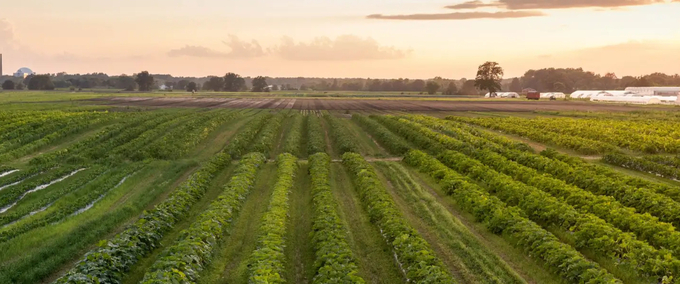November 27, 2025 | 22:25 GMT +7
November 27, 2025 | 22:25 GMT +7
Hotline: 0913.378.918
November 27, 2025 | 22:25 GMT +7
Hotline: 0913.378.918

The Chef's Garden in Ohio.
Photo: Courtesy The Chef's Garden
Bob Jones is the third generation in his family to run The Chef’s Garden, a 300-acre farm in Ohio that has used regenerative agriculture methods for the last 10 years.
“Our belief is that modern agriculture in the United States is broken, both economically and agronomically,” said Jones. The model for decades has been to go to the bank and borrow operating capital with the hope that it can all be paid back, a cycle of debt that makes it difficult for farms to be financially sustainable. “That’s how we’ve gotten to a tremendously shrinking number of farms in the United States,” said Jones.
To combat that, the Jones family decided to veer away from the conventional farming model. Instead, they invested in regenerative methods like rotating fields in thirds: land for crops to be harvested, land to be filled with cover crops, and land to be left alone. The result is soil that has time to recover, regain microbes that keep the soil healthy, and grow higher quality produce that has gained a reputation. (The farm now provides produce for Michelin Star restaurants across the country.)
Farmers at The Chef’s Garden are also experimenting with new methods to scale up their operations while maintaining the fields. “To see these guys doing regenerative practices on a major scale was shocking,” said Dr. Nasha Winters, a naturopathic doctor who recently toured The Chef’s Garden. “They took us through all these growing environments, from microgreens to various indoor and outdoor crops, different temperature greenhouses and lighting processes—how technology is meeting traditional old farming practices was cool to see.”
At the end of the tour, Winters watched produce being packaged for shipment. She was in awe as she saw recipients that included top chefs at places like the Four Seasons and the Ritz-Carlton. “You’re recognizing that people are willing to pay top dollar and that this can compete with conventional farming,” said Winters. “But they also allow a more cost-affordable approach to eating really healthy.”
Connecting soil to human health
For decades, farmers have leaned on chemical fertilizers and pesticides to yield larger amounts of monocrops. The more robust harvests help farmers pay back start-up loans and turn profits. But decades of chemicals have ruined soils, making them less capable of providing nourishment for the crops, and lessening their nutritional value as a result.
They also can have adverse affects on humans. Winters is an expert in metabolic oncology, metabolic health, and terrain health. Diagnosed with cancer at 19, Winters was baffled as to how she, a young person in rural Kansas, could be struck with such a disease. She believes her exposure to big farms using pesticides contributed to her diagnosis.
Now in her fifties, Winters advocates for holistic health practices. “You have to go out of your way to seek out and ingest healthy food today,” she said. “To tell the average American or anybody in a western developed country to eat healthy, that leaves a ton of room for interpretation.”
When trying to eat healthy, we often tend to look at the produce itself, but the quality of the soil in which it was grown is more indicative of a plant’s nutritional value.
(QZ)

(VAN) A new study reveals how the simultaneous effects of ocean acidification, salinity and loss of oxygen are making the world more fragile.

(VAN) Hopes are growing that the creation of the first 3D turkey gut model could be a turning point in the battle against the virulent blackhead disease.

(VAN) Tyson, America’s biggest meat supplier, plans to shutter one of its largest beef processing plants as the industry continues to struggle with low cattle supplies and political pressure from Washington.

(VAN) New FAO study shows how digital solutions are empowering farmers and fishers to prevent losses and build resilient agrifood systems.

(VAN) Brazil's COP30 presidency pushed through a compromise climate deal on Saturday that would boost finance for poor nations coping with global warming but that omitted any mention of the fossil fuels driving it.

(VAN) Poultry farmers in the UK have been warned that they could face one of the worst winters yet for bird flu.

(VAN) Prices of main-crop paddy have risen sharply, with jasmine rice hitting 16,100 baht per tonne — the highest level in years.